MGBBT1TEN - Tourism Environment: Sustainable Destination Analysis
VerifiedAdded on 2023/06/07
|8
|2495
|77
Essay
AI Summary
This essay provides an analysis of the tourism environment with a focus on sustainable tourism practices, using Thailand as a case study. It discusses the principles of sustainable tourism, the roles of various stakeholders including government organizations, NGOs, and local communities, and the in...
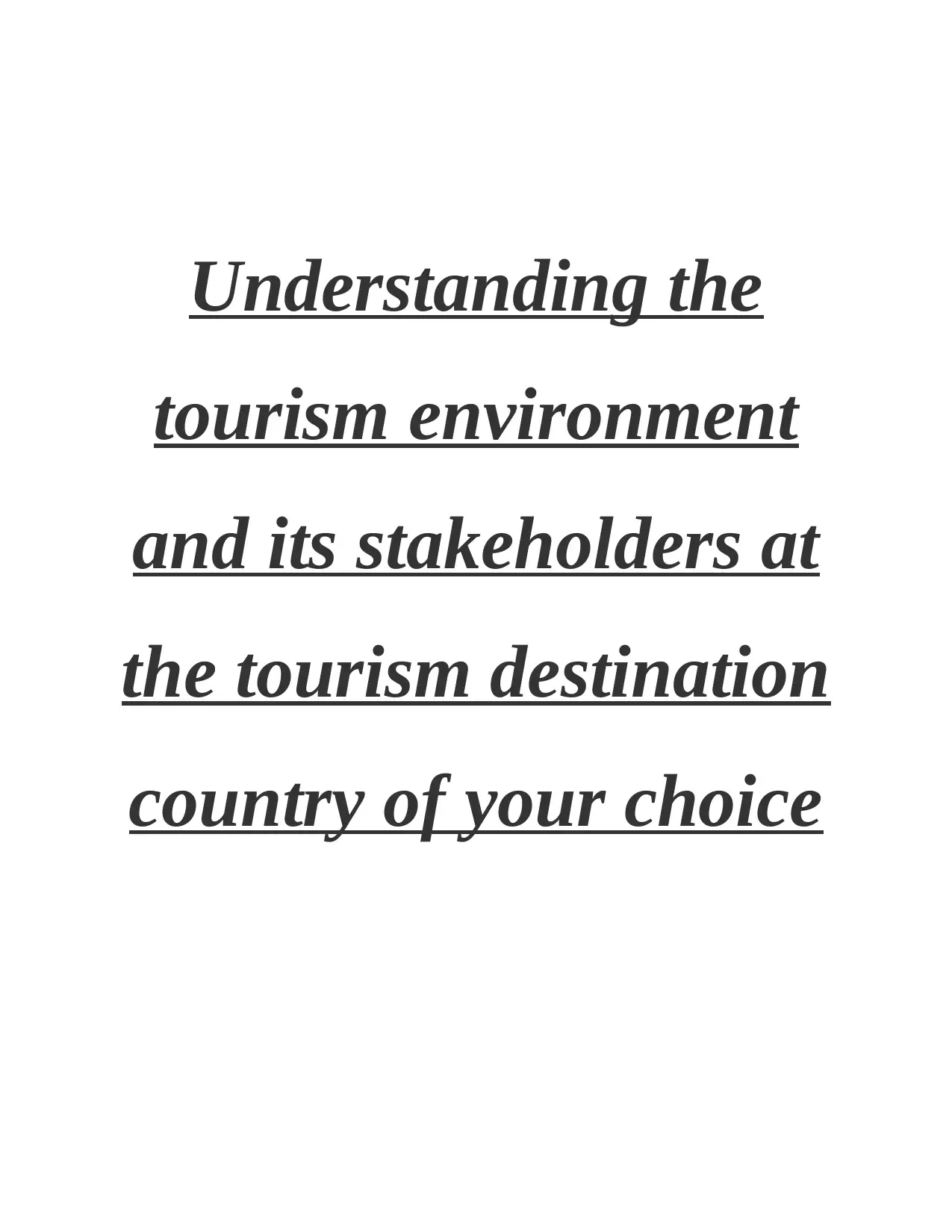
Understanding the
tourism environment
and its stakeholders at
the tourism destination
country of your choice
tourism environment
and its stakeholders at
the tourism destination
country of your choice
Paraphrase This Document
Need a fresh take? Get an instant paraphrase of this document with our AI Paraphraser

Contents
INTRODUCTION...........................................................................................................................1
MAIN BODY...................................................................................................................................1
CONCLUSION................................................................................................................................5
REFERENCES................................................................................................................................6
INTRODUCTION...........................................................................................................................1
MAIN BODY...................................................................................................................................1
CONCLUSION................................................................................................................................5
REFERENCES................................................................................................................................6
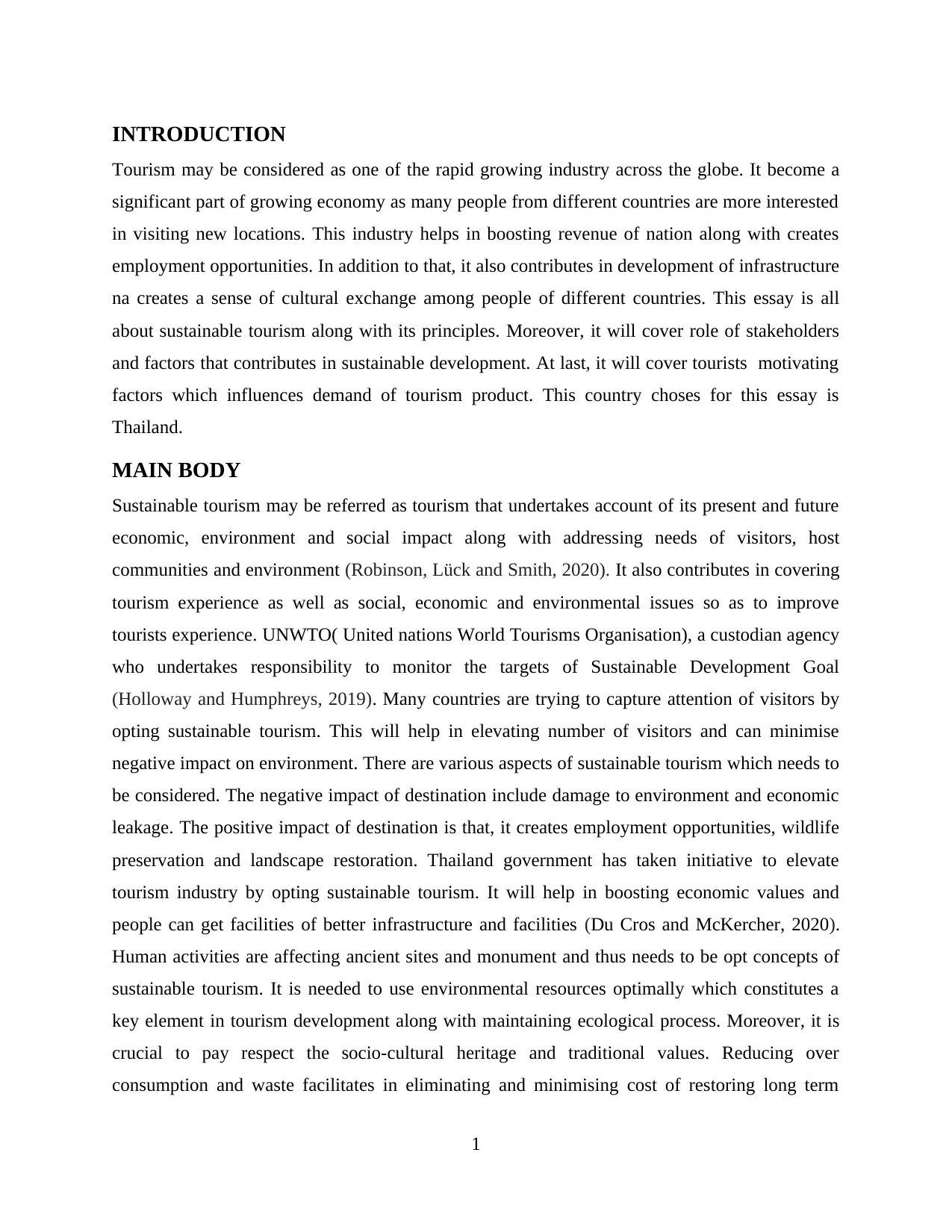
INTRODUCTION
Tourism may be considered as one of the rapid growing industry across the globe. It become a
significant part of growing economy as many people from different countries are more interested
in visiting new locations. This industry helps in boosting revenue of nation along with creates
employment opportunities. In addition to that, it also contributes in development of infrastructure
na creates a sense of cultural exchange among people of different countries. This essay is all
about sustainable tourism along with its principles. Moreover, it will cover role of stakeholders
and factors that contributes in sustainable development. At last, it will cover tourists motivating
factors which influences demand of tourism product. This country choses for this essay is
Thailand.
MAIN BODY
Sustainable tourism may be referred as tourism that undertakes account of its present and future
economic, environment and social impact along with addressing needs of visitors, host
communities and environment (Robinson, Lück and Smith, 2020). It also contributes in covering
tourism experience as well as social, economic and environmental issues so as to improve
tourists experience. UNWTO( United nations World Tourisms Organisation), a custodian agency
who undertakes responsibility to monitor the targets of Sustainable Development Goal
(Holloway and Humphreys, 2019). Many countries are trying to capture attention of visitors by
opting sustainable tourism. This will help in elevating number of visitors and can minimise
negative impact on environment. There are various aspects of sustainable tourism which needs to
be considered. The negative impact of destination include damage to environment and economic
leakage. The positive impact of destination is that, it creates employment opportunities, wildlife
preservation and landscape restoration. Thailand government has taken initiative to elevate
tourism industry by opting sustainable tourism. It will help in boosting economic values and
people can get facilities of better infrastructure and facilities (Du Cros and McKercher, 2020).
Human activities are affecting ancient sites and monument and thus needs to be opt concepts of
sustainable tourism. It is needed to use environmental resources optimally which constitutes a
key element in tourism development along with maintaining ecological process. Moreover, it is
crucial to pay respect the socio-cultural heritage and traditional values. Reducing over
consumption and waste facilitates in eliminating and minimising cost of restoring long term
1
Tourism may be considered as one of the rapid growing industry across the globe. It become a
significant part of growing economy as many people from different countries are more interested
in visiting new locations. This industry helps in boosting revenue of nation along with creates
employment opportunities. In addition to that, it also contributes in development of infrastructure
na creates a sense of cultural exchange among people of different countries. This essay is all
about sustainable tourism along with its principles. Moreover, it will cover role of stakeholders
and factors that contributes in sustainable development. At last, it will cover tourists motivating
factors which influences demand of tourism product. This country choses for this essay is
Thailand.
MAIN BODY
Sustainable tourism may be referred as tourism that undertakes account of its present and future
economic, environment and social impact along with addressing needs of visitors, host
communities and environment (Robinson, Lück and Smith, 2020). It also contributes in covering
tourism experience as well as social, economic and environmental issues so as to improve
tourists experience. UNWTO( United nations World Tourisms Organisation), a custodian agency
who undertakes responsibility to monitor the targets of Sustainable Development Goal
(Holloway and Humphreys, 2019). Many countries are trying to capture attention of visitors by
opting sustainable tourism. This will help in elevating number of visitors and can minimise
negative impact on environment. There are various aspects of sustainable tourism which needs to
be considered. The negative impact of destination include damage to environment and economic
leakage. The positive impact of destination is that, it creates employment opportunities, wildlife
preservation and landscape restoration. Thailand government has taken initiative to elevate
tourism industry by opting sustainable tourism. It will help in boosting economic values and
people can get facilities of better infrastructure and facilities (Du Cros and McKercher, 2020).
Human activities are affecting ancient sites and monument and thus needs to be opt concepts of
sustainable tourism. It is needed to use environmental resources optimally which constitutes a
key element in tourism development along with maintaining ecological process. Moreover, it is
crucial to pay respect the socio-cultural heritage and traditional values. Reducing over
consumption and waste facilitates in eliminating and minimising cost of restoring long term
1
⊘ This is a preview!⊘
Do you want full access?
Subscribe today to unlock all pages.

Trusted by 1+ million students worldwide
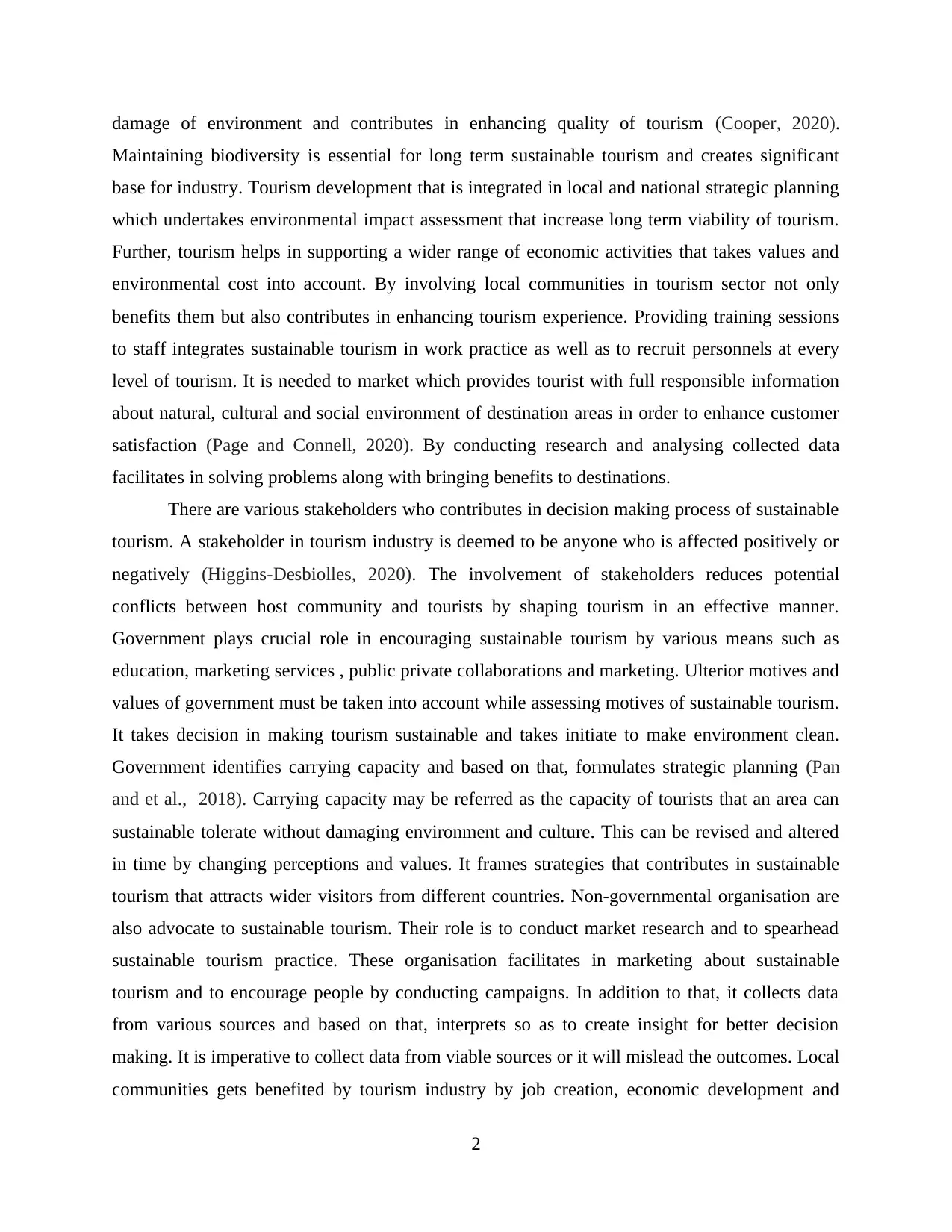
damage of environment and contributes in enhancing quality of tourism (Cooper, 2020).
Maintaining biodiversity is essential for long term sustainable tourism and creates significant
base for industry. Tourism development that is integrated in local and national strategic planning
which undertakes environmental impact assessment that increase long term viability of tourism.
Further, tourism helps in supporting a wider range of economic activities that takes values and
environmental cost into account. By involving local communities in tourism sector not only
benefits them but also contributes in enhancing tourism experience. Providing training sessions
to staff integrates sustainable tourism in work practice as well as to recruit personnels at every
level of tourism. It is needed to market which provides tourist with full responsible information
about natural, cultural and social environment of destination areas in order to enhance customer
satisfaction (Page and Connell, 2020). By conducting research and analysing collected data
facilitates in solving problems along with bringing benefits to destinations.
There are various stakeholders who contributes in decision making process of sustainable
tourism. A stakeholder in tourism industry is deemed to be anyone who is affected positively or
negatively (Higgins-Desbiolles, 2020). The involvement of stakeholders reduces potential
conflicts between host community and tourists by shaping tourism in an effective manner.
Government plays crucial role in encouraging sustainable tourism by various means such as
education, marketing services , public private collaborations and marketing. Ulterior motives and
values of government must be taken into account while assessing motives of sustainable tourism.
It takes decision in making tourism sustainable and takes initiate to make environment clean.
Government identifies carrying capacity and based on that, formulates strategic planning (Pan
and et al., 2018). Carrying capacity may be referred as the capacity of tourists that an area can
sustainable tolerate without damaging environment and culture. This can be revised and altered
in time by changing perceptions and values. It frames strategies that contributes in sustainable
tourism that attracts wider visitors from different countries. Non-governmental organisation are
also advocate to sustainable tourism. Their role is to conduct market research and to spearhead
sustainable tourism practice. These organisation facilitates in marketing about sustainable
tourism and to encourage people by conducting campaigns. In addition to that, it collects data
from various sources and based on that, interprets so as to create insight for better decision
making. It is imperative to collect data from viable sources or it will mislead the outcomes. Local
communities gets benefited by tourism industry by job creation, economic development and
2
Maintaining biodiversity is essential for long term sustainable tourism and creates significant
base for industry. Tourism development that is integrated in local and national strategic planning
which undertakes environmental impact assessment that increase long term viability of tourism.
Further, tourism helps in supporting a wider range of economic activities that takes values and
environmental cost into account. By involving local communities in tourism sector not only
benefits them but also contributes in enhancing tourism experience. Providing training sessions
to staff integrates sustainable tourism in work practice as well as to recruit personnels at every
level of tourism. It is needed to market which provides tourist with full responsible information
about natural, cultural and social environment of destination areas in order to enhance customer
satisfaction (Page and Connell, 2020). By conducting research and analysing collected data
facilitates in solving problems along with bringing benefits to destinations.
There are various stakeholders who contributes in decision making process of sustainable
tourism. A stakeholder in tourism industry is deemed to be anyone who is affected positively or
negatively (Higgins-Desbiolles, 2020). The involvement of stakeholders reduces potential
conflicts between host community and tourists by shaping tourism in an effective manner.
Government plays crucial role in encouraging sustainable tourism by various means such as
education, marketing services , public private collaborations and marketing. Ulterior motives and
values of government must be taken into account while assessing motives of sustainable tourism.
It takes decision in making tourism sustainable and takes initiate to make environment clean.
Government identifies carrying capacity and based on that, formulates strategic planning (Pan
and et al., 2018). Carrying capacity may be referred as the capacity of tourists that an area can
sustainable tolerate without damaging environment and culture. This can be revised and altered
in time by changing perceptions and values. It frames strategies that contributes in sustainable
tourism that attracts wider visitors from different countries. Non-governmental organisation are
also advocate to sustainable tourism. Their role is to conduct market research and to spearhead
sustainable tourism practice. These organisation facilitates in marketing about sustainable
tourism and to encourage people by conducting campaigns. In addition to that, it collects data
from various sources and based on that, interprets so as to create insight for better decision
making. It is imperative to collect data from viable sources or it will mislead the outcomes. Local
communities gets benefited by tourism industry by job creation, economic development and
2
Paraphrase This Document
Need a fresh take? Get an instant paraphrase of this document with our AI Paraphraser
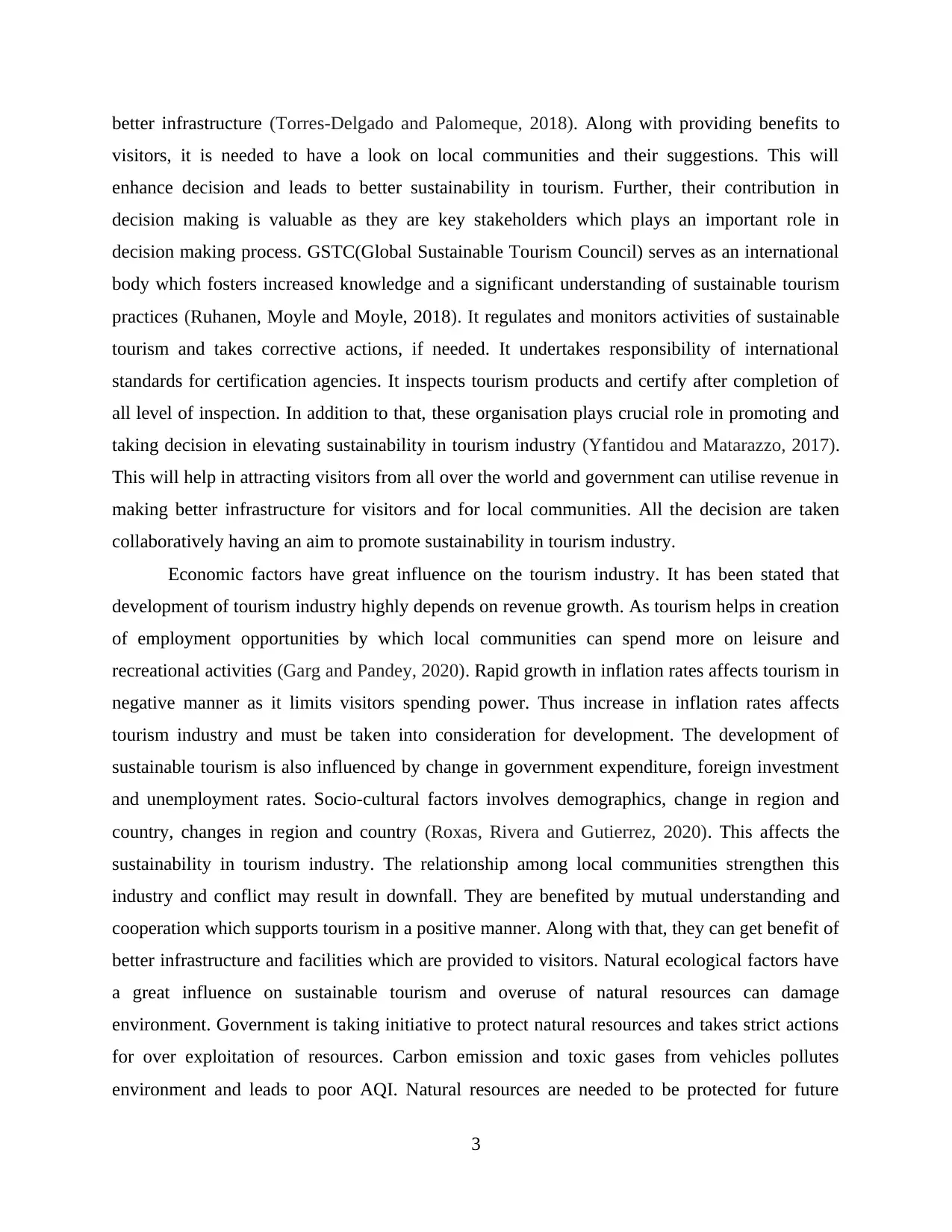
better infrastructure (Torres-Delgado and Palomeque, 2018). Along with providing benefits to
visitors, it is needed to have a look on local communities and their suggestions. This will
enhance decision and leads to better sustainability in tourism. Further, their contribution in
decision making is valuable as they are key stakeholders which plays an important role in
decision making process. GSTC(Global Sustainable Tourism Council) serves as an international
body which fosters increased knowledge and a significant understanding of sustainable tourism
practices (Ruhanen, Moyle and Moyle, 2018). It regulates and monitors activities of sustainable
tourism and takes corrective actions, if needed. It undertakes responsibility of international
standards for certification agencies. It inspects tourism products and certify after completion of
all level of inspection. In addition to that, these organisation plays crucial role in promoting and
taking decision in elevating sustainability in tourism industry (Yfantidou and Matarazzo, 2017).
This will help in attracting visitors from all over the world and government can utilise revenue in
making better infrastructure for visitors and for local communities. All the decision are taken
collaboratively having an aim to promote sustainability in tourism industry.
Economic factors have great influence on the tourism industry. It has been stated that
development of tourism industry highly depends on revenue growth. As tourism helps in creation
of employment opportunities by which local communities can spend more on leisure and
recreational activities (Garg and Pandey, 2020). Rapid growth in inflation rates affects tourism in
negative manner as it limits visitors spending power. Thus increase in inflation rates affects
tourism industry and must be taken into consideration for development. The development of
sustainable tourism is also influenced by change in government expenditure, foreign investment
and unemployment rates. Socio-cultural factors involves demographics, change in region and
country, changes in region and country (Roxas, Rivera and Gutierrez, 2020). This affects the
sustainability in tourism industry. The relationship among local communities strengthen this
industry and conflict may result in downfall. They are benefited by mutual understanding and
cooperation which supports tourism in a positive manner. Along with that, they can get benefit of
better infrastructure and facilities which are provided to visitors. Natural ecological factors have
a great influence on sustainable tourism and overuse of natural resources can damage
environment. Government is taking initiative to protect natural resources and takes strict actions
for over exploitation of resources. Carbon emission and toxic gases from vehicles pollutes
environment and leads to poor AQI. Natural resources are needed to be protected for future
3
visitors, it is needed to have a look on local communities and their suggestions. This will
enhance decision and leads to better sustainability in tourism. Further, their contribution in
decision making is valuable as they are key stakeholders which plays an important role in
decision making process. GSTC(Global Sustainable Tourism Council) serves as an international
body which fosters increased knowledge and a significant understanding of sustainable tourism
practices (Ruhanen, Moyle and Moyle, 2018). It regulates and monitors activities of sustainable
tourism and takes corrective actions, if needed. It undertakes responsibility of international
standards for certification agencies. It inspects tourism products and certify after completion of
all level of inspection. In addition to that, these organisation plays crucial role in promoting and
taking decision in elevating sustainability in tourism industry (Yfantidou and Matarazzo, 2017).
This will help in attracting visitors from all over the world and government can utilise revenue in
making better infrastructure for visitors and for local communities. All the decision are taken
collaboratively having an aim to promote sustainability in tourism industry.
Economic factors have great influence on the tourism industry. It has been stated that
development of tourism industry highly depends on revenue growth. As tourism helps in creation
of employment opportunities by which local communities can spend more on leisure and
recreational activities (Garg and Pandey, 2020). Rapid growth in inflation rates affects tourism in
negative manner as it limits visitors spending power. Thus increase in inflation rates affects
tourism industry and must be taken into consideration for development. The development of
sustainable tourism is also influenced by change in government expenditure, foreign investment
and unemployment rates. Socio-cultural factors involves demographics, change in region and
country, changes in region and country (Roxas, Rivera and Gutierrez, 2020). This affects the
sustainability in tourism industry. The relationship among local communities strengthen this
industry and conflict may result in downfall. They are benefited by mutual understanding and
cooperation which supports tourism in a positive manner. Along with that, they can get benefit of
better infrastructure and facilities which are provided to visitors. Natural ecological factors have
a great influence on sustainable tourism and overuse of natural resources can damage
environment. Government is taking initiative to protect natural resources and takes strict actions
for over exploitation of resources. Carbon emission and toxic gases from vehicles pollutes
environment and leads to poor AQI. Natural resources are needed to be protected for future
3
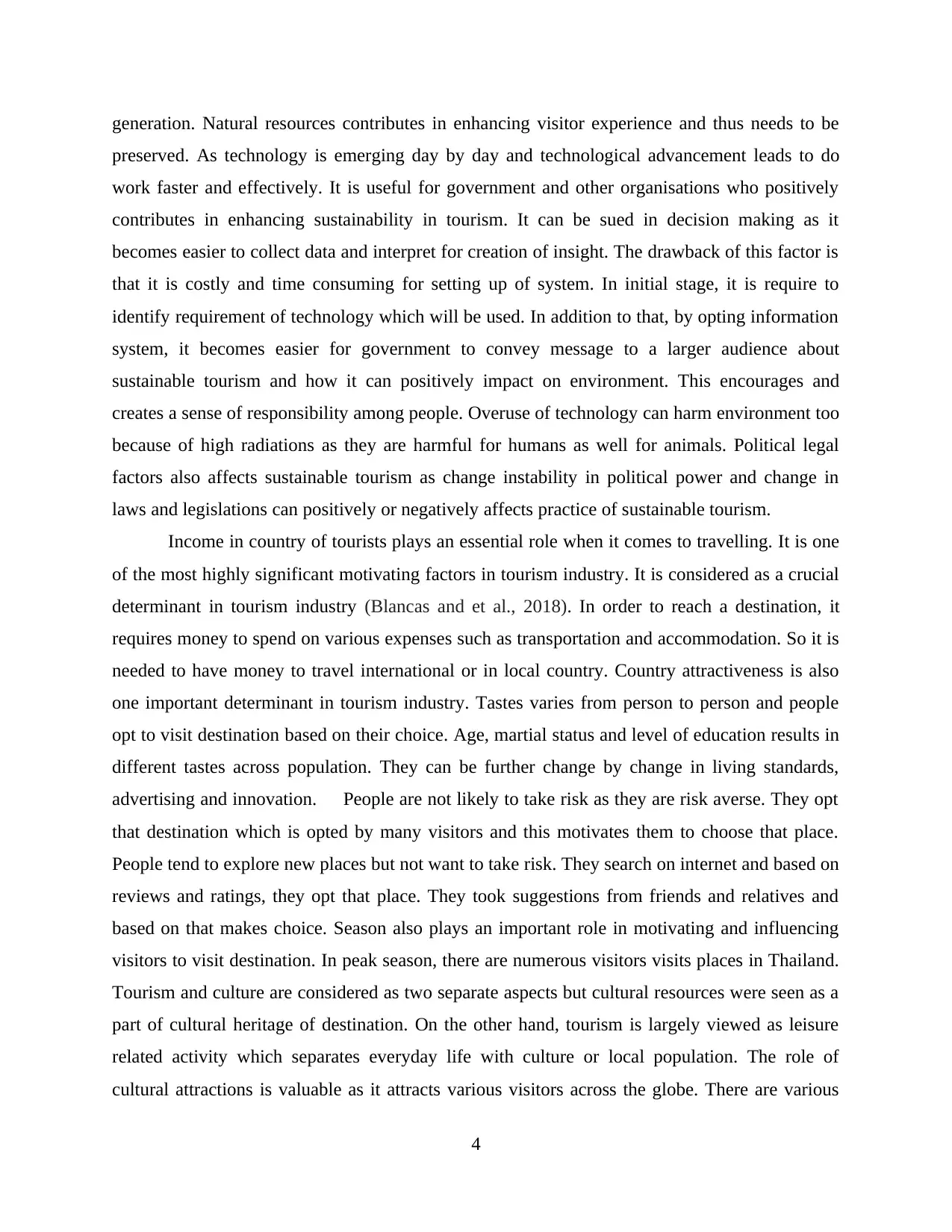
generation. Natural resources contributes in enhancing visitor experience and thus needs to be
preserved. As technology is emerging day by day and technological advancement leads to do
work faster and effectively. It is useful for government and other organisations who positively
contributes in enhancing sustainability in tourism. It can be sued in decision making as it
becomes easier to collect data and interpret for creation of insight. The drawback of this factor is
that it is costly and time consuming for setting up of system. In initial stage, it is require to
identify requirement of technology which will be used. In addition to that, by opting information
system, it becomes easier for government to convey message to a larger audience about
sustainable tourism and how it can positively impact on environment. This encourages and
creates a sense of responsibility among people. Overuse of technology can harm environment too
because of high radiations as they are harmful for humans as well for animals. Political legal
factors also affects sustainable tourism as change instability in political power and change in
laws and legislations can positively or negatively affects practice of sustainable tourism.
Income in country of tourists plays an essential role when it comes to travelling. It is one
of the most highly significant motivating factors in tourism industry. It is considered as a crucial
determinant in tourism industry (Blancas and et al., 2018). In order to reach a destination, it
requires money to spend on various expenses such as transportation and accommodation. So it is
needed to have money to travel international or in local country. Country attractiveness is also
one important determinant in tourism industry. Tastes varies from person to person and people
opt to visit destination based on their choice. Age, martial status and level of education results in
different tastes across population. They can be further change by change in living standards,
advertising and innovation. People are not likely to take risk as they are risk averse. They opt
that destination which is opted by many visitors and this motivates them to choose that place.
People tend to explore new places but not want to take risk. They search on internet and based on
reviews and ratings, they opt that place. They took suggestions from friends and relatives and
based on that makes choice. Season also plays an important role in motivating and influencing
visitors to visit destination. In peak season, there are numerous visitors visits places in Thailand.
Tourism and culture are considered as two separate aspects but cultural resources were seen as a
part of cultural heritage of destination. On the other hand, tourism is largely viewed as leisure
related activity which separates everyday life with culture or local population. The role of
cultural attractions is valuable as it attracts various visitors across the globe. There are various
4
preserved. As technology is emerging day by day and technological advancement leads to do
work faster and effectively. It is useful for government and other organisations who positively
contributes in enhancing sustainability in tourism. It can be sued in decision making as it
becomes easier to collect data and interpret for creation of insight. The drawback of this factor is
that it is costly and time consuming for setting up of system. In initial stage, it is require to
identify requirement of technology which will be used. In addition to that, by opting information
system, it becomes easier for government to convey message to a larger audience about
sustainable tourism and how it can positively impact on environment. This encourages and
creates a sense of responsibility among people. Overuse of technology can harm environment too
because of high radiations as they are harmful for humans as well for animals. Political legal
factors also affects sustainable tourism as change instability in political power and change in
laws and legislations can positively or negatively affects practice of sustainable tourism.
Income in country of tourists plays an essential role when it comes to travelling. It is one
of the most highly significant motivating factors in tourism industry. It is considered as a crucial
determinant in tourism industry (Blancas and et al., 2018). In order to reach a destination, it
requires money to spend on various expenses such as transportation and accommodation. So it is
needed to have money to travel international or in local country. Country attractiveness is also
one important determinant in tourism industry. Tastes varies from person to person and people
opt to visit destination based on their choice. Age, martial status and level of education results in
different tastes across population. They can be further change by change in living standards,
advertising and innovation. People are not likely to take risk as they are risk averse. They opt
that destination which is opted by many visitors and this motivates them to choose that place.
People tend to explore new places but not want to take risk. They search on internet and based on
reviews and ratings, they opt that place. They took suggestions from friends and relatives and
based on that makes choice. Season also plays an important role in motivating and influencing
visitors to visit destination. In peak season, there are numerous visitors visits places in Thailand.
Tourism and culture are considered as two separate aspects but cultural resources were seen as a
part of cultural heritage of destination. On the other hand, tourism is largely viewed as leisure
related activity which separates everyday life with culture or local population. The role of
cultural attractions is valuable as it attracts various visitors across the globe. There are various
4
⊘ This is a preview!⊘
Do you want full access?
Subscribe today to unlock all pages.

Trusted by 1+ million students worldwide
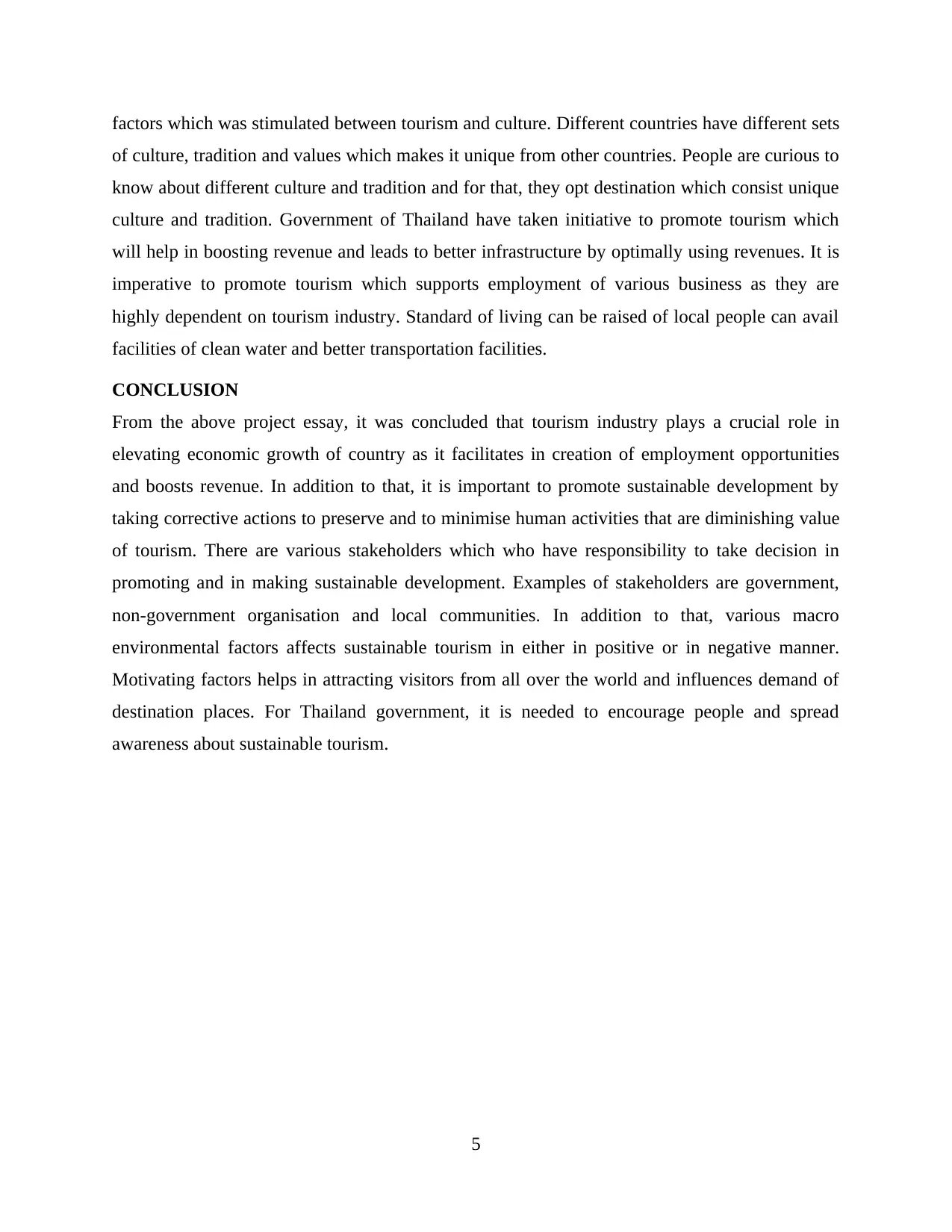
factors which was stimulated between tourism and culture. Different countries have different sets
of culture, tradition and values which makes it unique from other countries. People are curious to
know about different culture and tradition and for that, they opt destination which consist unique
culture and tradition. Government of Thailand have taken initiative to promote tourism which
will help in boosting revenue and leads to better infrastructure by optimally using revenues. It is
imperative to promote tourism which supports employment of various business as they are
highly dependent on tourism industry. Standard of living can be raised of local people can avail
facilities of clean water and better transportation facilities.
CONCLUSION
From the above project essay, it was concluded that tourism industry plays a crucial role in
elevating economic growth of country as it facilitates in creation of employment opportunities
and boosts revenue. In addition to that, it is important to promote sustainable development by
taking corrective actions to preserve and to minimise human activities that are diminishing value
of tourism. There are various stakeholders which who have responsibility to take decision in
promoting and in making sustainable development. Examples of stakeholders are government,
non-government organisation and local communities. In addition to that, various macro
environmental factors affects sustainable tourism in either in positive or in negative manner.
Motivating factors helps in attracting visitors from all over the world and influences demand of
destination places. For Thailand government, it is needed to encourage people and spread
awareness about sustainable tourism.
5
of culture, tradition and values which makes it unique from other countries. People are curious to
know about different culture and tradition and for that, they opt destination which consist unique
culture and tradition. Government of Thailand have taken initiative to promote tourism which
will help in boosting revenue and leads to better infrastructure by optimally using revenues. It is
imperative to promote tourism which supports employment of various business as they are
highly dependent on tourism industry. Standard of living can be raised of local people can avail
facilities of clean water and better transportation facilities.
CONCLUSION
From the above project essay, it was concluded that tourism industry plays a crucial role in
elevating economic growth of country as it facilitates in creation of employment opportunities
and boosts revenue. In addition to that, it is important to promote sustainable development by
taking corrective actions to preserve and to minimise human activities that are diminishing value
of tourism. There are various stakeholders which who have responsibility to take decision in
promoting and in making sustainable development. Examples of stakeholders are government,
non-government organisation and local communities. In addition to that, various macro
environmental factors affects sustainable tourism in either in positive or in negative manner.
Motivating factors helps in attracting visitors from all over the world and influences demand of
destination places. For Thailand government, it is needed to encourage people and spread
awareness about sustainable tourism.
5
Paraphrase This Document
Need a fresh take? Get an instant paraphrase of this document with our AI Paraphraser
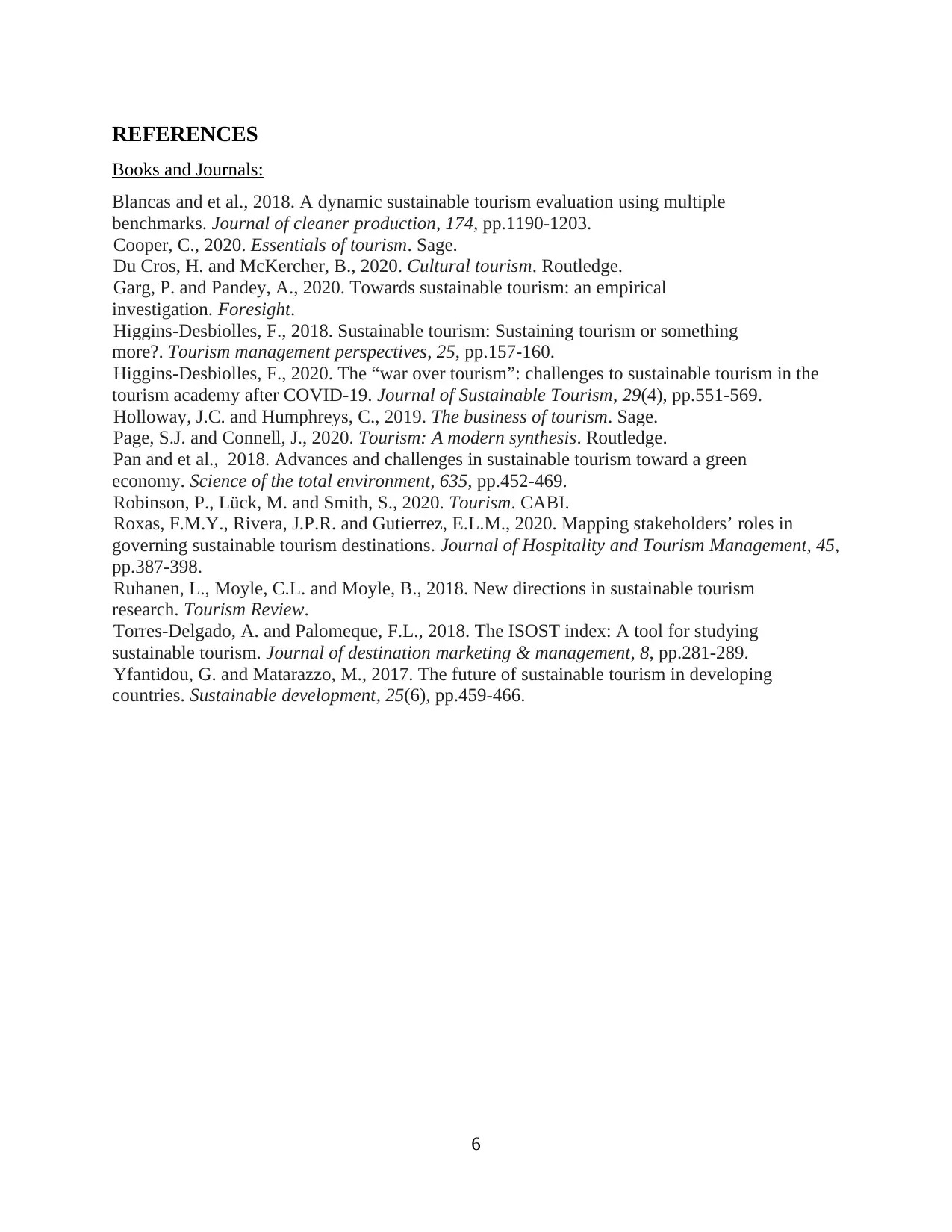
REFERENCES
Books and Journals:
Blancas and et al., 2018. A dynamic sustainable tourism evaluation using multiple
benchmarks. Journal of cleaner production, 174, pp.1190-1203.
Cooper, C., 2020. Essentials of tourism. Sage.
Du Cros, H. and McKercher, B., 2020. Cultural tourism. Routledge.
Garg, P. and Pandey, A., 2020. Towards sustainable tourism: an empirical
investigation. Foresight.
Higgins-Desbiolles, F., 2018. Sustainable tourism: Sustaining tourism or something
more?. Tourism management perspectives, 25, pp.157-160.
Higgins-Desbiolles, F., 2020. The “war over tourism”: challenges to sustainable tourism in the
tourism academy after COVID-19. Journal of Sustainable Tourism, 29(4), pp.551-569.
Holloway, J.C. and Humphreys, C., 2019. The business of tourism. Sage.
Page, S.J. and Connell, J., 2020. Tourism: A modern synthesis. Routledge.
Pan and et al., 2018. Advances and challenges in sustainable tourism toward a green
economy. Science of the total environment, 635, pp.452-469.
Robinson, P., Lück, M. and Smith, S., 2020. Tourism. CABI.
Roxas, F.M.Y., Rivera, J.P.R. and Gutierrez, E.L.M., 2020. Mapping stakeholders’ roles in
governing sustainable tourism destinations. Journal of Hospitality and Tourism Management, 45,
pp.387-398.
Ruhanen, L., Moyle, C.L. and Moyle, B., 2018. New directions in sustainable tourism
research. Tourism Review.
Torres-Delgado, A. and Palomeque, F.L., 2018. The ISOST index: A tool for studying
sustainable tourism. Journal of destination marketing & management, 8, pp.281-289.
Yfantidou, G. and Matarazzo, M., 2017. The future of sustainable tourism in developing
countries. Sustainable development, 25(6), pp.459-466.
6
Books and Journals:
Blancas and et al., 2018. A dynamic sustainable tourism evaluation using multiple
benchmarks. Journal of cleaner production, 174, pp.1190-1203.
Cooper, C., 2020. Essentials of tourism. Sage.
Du Cros, H. and McKercher, B., 2020. Cultural tourism. Routledge.
Garg, P. and Pandey, A., 2020. Towards sustainable tourism: an empirical
investigation. Foresight.
Higgins-Desbiolles, F., 2018. Sustainable tourism: Sustaining tourism or something
more?. Tourism management perspectives, 25, pp.157-160.
Higgins-Desbiolles, F., 2020. The “war over tourism”: challenges to sustainable tourism in the
tourism academy after COVID-19. Journal of Sustainable Tourism, 29(4), pp.551-569.
Holloway, J.C. and Humphreys, C., 2019. The business of tourism. Sage.
Page, S.J. and Connell, J., 2020. Tourism: A modern synthesis. Routledge.
Pan and et al., 2018. Advances and challenges in sustainable tourism toward a green
economy. Science of the total environment, 635, pp.452-469.
Robinson, P., Lück, M. and Smith, S., 2020. Tourism. CABI.
Roxas, F.M.Y., Rivera, J.P.R. and Gutierrez, E.L.M., 2020. Mapping stakeholders’ roles in
governing sustainable tourism destinations. Journal of Hospitality and Tourism Management, 45,
pp.387-398.
Ruhanen, L., Moyle, C.L. and Moyle, B., 2018. New directions in sustainable tourism
research. Tourism Review.
Torres-Delgado, A. and Palomeque, F.L., 2018. The ISOST index: A tool for studying
sustainable tourism. Journal of destination marketing & management, 8, pp.281-289.
Yfantidou, G. and Matarazzo, M., 2017. The future of sustainable tourism in developing
countries. Sustainable development, 25(6), pp.459-466.
6
1 out of 8
Related Documents
Your All-in-One AI-Powered Toolkit for Academic Success.
+13062052269
info@desklib.com
Available 24*7 on WhatsApp / Email
![[object Object]](/_next/static/media/star-bottom.7253800d.svg)
Unlock your academic potential
© 2024 | Zucol Services PVT LTD | All rights reserved.



